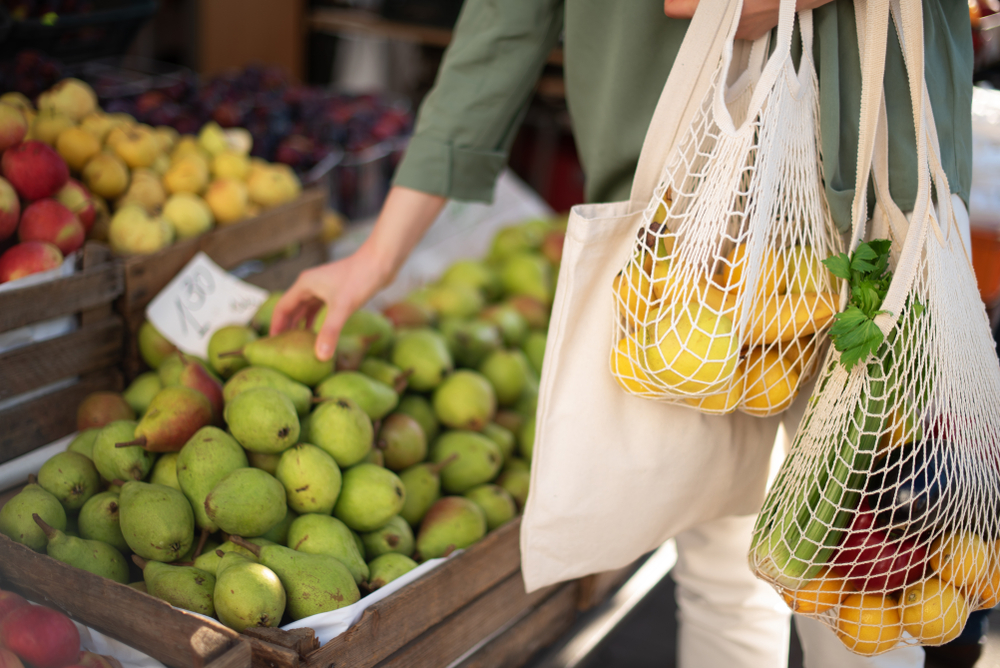There are so many small steps we can take to help protect the environment, like using metal straws instead of plastic ones, or reducing food waste by eating leftovers and making use of the vegetables in the fridge before they go bad. For more ideas, Thrive loves Laurie David and Heather Reisman’s new book, Imagine It!, where the authors offer simple ways to replace old, planet-hurting habits with improved sustainable ones — and this week, you can enter for a chance to win a copy! (Find more details on the book and the giveaway here.)
We asked our Thrive community to share with us the small ways they do their part in protecting the environment on a regular basis. Which of these strategies will you try?
Turn off the lights when you leave the room
“Ever since I was little, I was told to turn the lights off when I left a room. I’ve continued that habit into adulthood and have passed it on to my kids. There’s no need to keep the light on in an empty room, and every small green gesture helps.”
—Marta Rzeszowska Chavent, management and change consultant, France
Clean up when you’re out on a walk
“Especially since the pandemic started, I have been increasing my walks and bike rides. I always take a bag with me, and since gloves are with us now along with masks, I pick up garbage as I walk or ride along, cleaning up the areas around me. It does not take any longer and feels great. Plus, after rainy days, I bring seeds along for wildflowers and toss them about on my walk to help make places a bit prettier!”
—Lori Paulin, global head of customer empowerment and user groups, Palo Alto, CA
Bring your own bags to the grocery store
“Since the pandemic began, our local grocery stores were forced to ban reusable bags. This has resulted in the excessive use of plastic bags for each grocery run. To help mitigate this, I began to request that the grocery clerk simply reload my groceries into the cart at checkout. Then, I would transfer the items into the reusable bags in the trunk of my car from the parking lot. This has allowed me to follow COVID protocols while reducing my carbon footprint!”
—Kaleana Quibell, wellbeing consultant, Mill Valley, CA
Start a backyard garden
“For the last seven or eight years, I’ve adopted my mother’s hobby of keeping a garden of herbs and greens outside my house. We started off planting basil and Indian oregano. My mom wanted to grow jasmine and henna and papaya and mango. I have many herbs like basil, oregano, betel leaf and microgreens, which I pluck from the garden on a weekly basis to use in curries and other recipes. I love that I can go sit in my little piece of heaven which is my own green patch, and feel proud that I have contributed to the environment.”
—Anitha Balaraj, executive coach, Chennai, India
Swap out your paper towels for cloth
“In an effort to leave a better world for my grandchildren, I started using cloth napkins and cotton towels instead of paper napkins and towels. Sadly, paper towel production not only destroys a large number of trees but also uses a lot of water. Not to mention, a lot of our paper products end up in landfills. I’ve also started using wool dryer balls versus the dryer sheets which are single-use and loaded with chemicals. I’m taking an inch-by-inch approach as I work to be a better steward of our planet.”
—Nicki Anderson, director, Women’s Leadership Program at Benedictine University, Lisle, IL
Start using a metal water bottle
“I do not use plastic bottles anymore, and I’m making an effort to use only metal bottles that I refill when I am on the go. I also help a local organization, Child Creativity Lab, build STEAM kits for kid programs with recyclable materials and we encourage the local community and businesses to recycle materials going to trash by dropping them off at our lab.”
—Isabelle Bart, social entrepreneur and coach, Irvine, CA
Shop for eco-friendly clothes that last
“To help protect the environment, I’ve been buying clothes that last longer. Although these are more expensive than opting for those which are considered a part of ‘fast fashion,’ I can reuse my clothes for a long time and if the time comes and they don’t fit me anymore, I can sell them online so that other people can utilize them, or donate them to a local church or charity.”
—Joanna C., founder of The Millennial VA, Philippines
Get your family involved
“We have taken many steps as a family and are constantly looking for additional ways to soften our footprint and be mindful of our impact. We drive an electric car. We recycle all plastic bags and plastic film if we need to use them. We swapped our plastic sandwich bags for reusable ones. We also turn all our food scraps into compost with a local company in Atlanta called Compost Now. It is affordable and a great way to cut down on methane gases in our landfills.”
—Jessica Given, SAHM, Atlanta, GA
Follow us here and subscribe here for all the latest news on how you can keep Thriving.
Stay up to date or catch-up on all our podcasts with Arianna Huffington here


